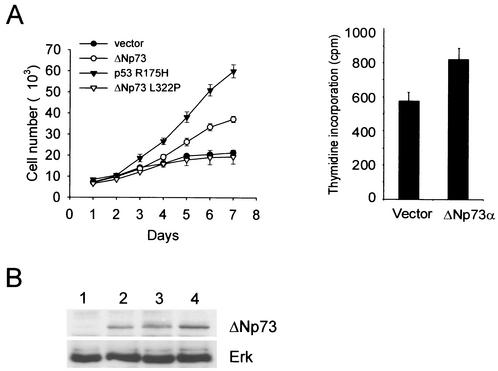FIG. 1.
(A) Short-term growth kinetics of MEFs (129 genetic background) transduced with recombinant MSCV/IRES/GFP retroviruses expressing GFP only (•) or coexpressing dominant-negative p53 R175H (▴), ΔNp73 (○), or tetramerization-defective ΔNp73 L322P (▵) are shown on the left. ΔNp73-expressing cells have a proliferative advantage over control cells. Cells were counted daily using a Coulter counter. Initial cultures showed an infectivity of 75 to 85% as demonstrated by GFP expression. After 7 days, GFP expression had increased to >95%, indicating self-selection, a finding consistent with the observed growth advantage. Identical results were seen with MEFs from a mixed 129×B6 genetic background. Results showing that ΔNp73 increases the fraction of cells in S phase are given on the right. Thymidine incorporation of passage 5 MEFs 3 days after infection with retroviruses was determined as indicated. The results are the average counts per minute ± the standard deviation (n = 8 wells/condition) of three independent experiments. (B) Expression of retrovirally transduced ΔNp73 in 129 MEFs. GFP-only infected MEFs (lane 1) or MEFs infected with retroviral constructs coexpressing ΔNp73 (MSCV based [lane 2] and Rpuro based [lane 3]) or ΔNp73 L322P (MSCV based [lane 4]) were harvested after 3 days. Expression was determined on total cell lysates by immunoblotting 50 μg of protein per lane with p73-specific ER15 antibody.

